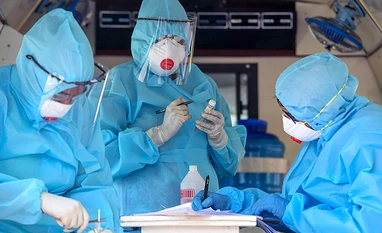Hospital operators, which have always been considered steady revenue and cash generators, have not been spared by the pandemic.
Stocks of Apollo Hospitals, Fortis Healthcare, Narayana Hrudayalaya, and Aster DM, which were trading near their all-time highs in January and February, have corrected by 23-42 per cent since.
Investor sentiment has been significantly hit after the outbreak and the lockdown is hurting business prospects of private health care services providers even more.
Visits to doctors and hospitals by people have declined significantly during the lockdown. While outpatient department (OPD) services are suspended, elective surgeries —ones planned in advance (excluding emergencies) — too are getting postponed.
This has led to loss in revenue for hospitals. Analysts say that for private hospitals, the present situation has led to a twin impact on their cash cow.
First, social distancing and localised curfews have delayed elective surgeries, which typically account for 60-70 per cent of volumes. Second, visa cancellations have led to a hiatus in medical tourism, which constitutes 10-12 per cent of industry revenue.
Medical tourism revenues are highly profitable. With significant impact on volumes and revenues, operating profit is, in turn, likely to remain impacted as fixed costs (wages and rentals) remain high for hospitals. And with profitability under pressure, earnings are bound to be at risk.
The pressure on hospital stocks comes at a time when Street sentiment was just beginning to see some improvement, given that concerns related to price controls (stents, knee replacements) were behind.
Further, most of the expansions, which were earlier leading to lower operating efficiency, had been completed and new hospitals were seeing better profitability.
Debt was reducing with better cash flows, and even promoters’ share pledges were reducing (like in case of Apollo Hospitals), leading to a major overhang being addressed.
However, the Covid disruption is now affecting businesses. Kapil Banga, assistant vice-president of ICRA, says the short-term outlook for the sector has turned negative due to a sharp fall in OPD and IPD volumes.
Companies are expected to feel the impact on their March quarter performance. Apollo’s business is likely to be hit severely as IPD/OPD patient volumes began falling in the last 10 days of March, said UBS Research.
Profit is projected to fall 24 per cent year-on-year and 34 per cent sequentially during the fourth quarter, according to ICICI Securities.
Fortis, too, had started seeing a decline in elective surgeries, and had, by the end of March, deferred marketing expenses and capex plans. Along with cost rationalisation (salary cuts), cost structuring of physicians was being worked on, said Elara Research.
Narayana Hrudayalaya’s domestic in- and out-patient volumes had fallen 30-40 per cent. For Aster DM, a 20 per cent decline in occupancy level was expected in India and the Gulf. Though the fall in crude oil prices should not impact its Dubai business (60 per cent of Gulf revenues), it may delay payments from Saudi Arabia, where 40 per cent business is government-sourced, say analysts.
However, the situation has worsened for the sector post March. The impact has intensified and occupancy in hospitals has dropped to 25-30 per cent, from 60-70 earlier, says ICRA, which also expects revenues to decline by over 50 per cent.
This impact is likely to continue for some time. Analysts think people will remain hesitant to visit doctors for now.
Nomura Research says even doctors are likely to remain selective, and may prefer fewer patients visiting them, as long as the Covid threat remains.
All this will keep services impacted. The more profitable medical tourism business may take longer to resume, looking at travel restrictions.
DSP Investment Managers sees a deferral in revenues from the March and June to the September and December quarters. Challenges are likely to persist for the sector in the near term, with analysts at Edelweiss saying the disruptions will precipitate earnings cuts, and valuations will remain subdued over the short-to-medium term.
Unlock 30+ premium stories daily hand-picked by our editors, across devices on browser and app.
Pick your 5 favourite companies, get a daily email with all news updates on them.
Full access to our intuitive epaper - clip, save, share articles from any device; newspaper archives from 2006.
Preferential invites to Business Standard events.
Curated newsletters on markets, personal finance, policy & politics, start-ups, technology, and more.
)